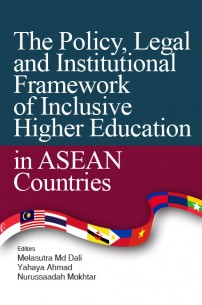This book, as an outcome of a collaborative research work funded by the Nippon Foundation and conducted by experts from five ASEAN universities within the Association of ASEAN University Network (AUNDPP-net) is a timely contribution at a time where ASEAN countries are increasingly adopting inclusive policies in all spheres of life. Many ASEAN countries have developed a relatively inclusive legal framework for primary and secondary education but fewer have paid attention to inclusive higher education. Given the increasing influence of higher education in transforming the quality of life, it would be remiss to exclude anyone, particularly people with disabilities. With inclusive policies in higher education, ASEAN will be able to produce more notable people with disabilities like the first visually impaired Senator in Malaysia, the late Professor Md. Salleh, and Professor Satoshi Fukushima, the first deafblind university faculty member in the world.
The authors acknowledged that wholesale policy borrowing from the Global North may not always be the optimal solution, as such, this book takes the spirit of ASEAN cooperation in learning from each other. This study is the first of its kind to produce a comparative analysis of the existing policy, legal and institutional frameworks in place for inclusive higher learning environments in four South-East Asian countries namely Malaysia, the Philippines, Vietnam, and Thailand. This book, catered primarily as a resource for university administrators overseeing university governance, highlights how several ASEAN countries are more advanced in their development of inclusiveness at a higher education level by having a legal framework that set institutional settings which can be taken as a model by neighbouring countries. By highlighting the weaknesses of existing system and how several countries are still behind in promoting inclusive higher education, many lessons can be learnt specifically by other ASEAN countries. This book will be of benefit for policymakers, researchers, and students working in the area of inclusive higher education policies in South East Asia.
Write a review
Your Name:Your Review: Note: HTML is not translated!
Rating: Bad Good
Enter the code in the box below:




